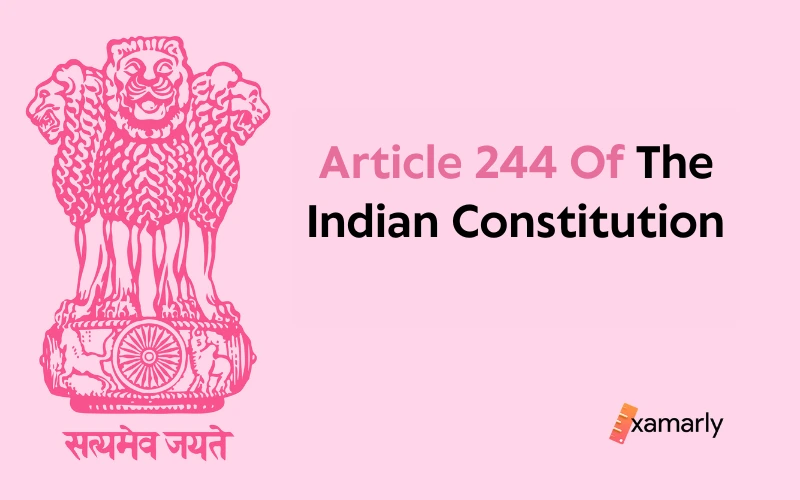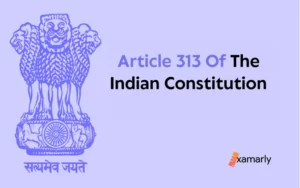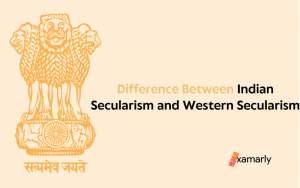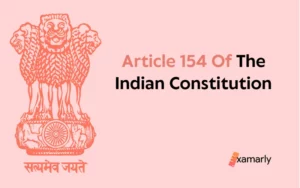Article 244 of the Indian Constitution deals with the administration of scheduled areas and tribal areas. The Constitution of India recognizes the unique culture and social practices of certain communities living in certain areas of the country, and Article 244A provides for the administration of these areas by special provisions.
In Part X of the Constitution of India, which deals with “The Scheduled And Tribal Areas”, there are 2 articles namely Article 244 and Article 244A that provide for the administration and control of these areas.
- What Is Article 244 Of The Indian Constitution?
- Which Amendment Has Amended Article 244?
- When Was Article 244 Approved?
- Article 244A Of The Indian Constitution
- Who Introduced Article 244A?
- How Is Article 244(A) Different From The Constitution's Sixth Schedule?
- How Did The Demand For Implementing Article 244(A) In Assam Arises?
- What Are Autonomous States?
- In A Nutshell
- FAQs
- What Distinguishes Tribal Areas From Scheduled Areas?
- Under Which Article Of The Indian Constitution Are Scheduled And Tribal Territories Defined?
- Which Amendment Has Inserted Article 244A?
- What Is The 5th Schedule Of The Constitution Of India Deals With?
- What Is The 6th Schedule Of The Constitution Of India Deals With?
What Is Article 244 Of The Indian Constitution?
Scheduled areas and tribal areas are administered according to Article 244 of the Indian Constitution. In the following two clauses, the constitutional provisions of the Article stated previously are laid forth in more detail:
- With the exception of four states, Assam, Meghalaya, Tripura, and Mizoram, the Fifth Schedule’s provisions must be followed when it comes to the administration and control of Scheduled Areas and Scheduled Tribes across all states.
- Tribal territories of the States of Meghalaya, Mizoram, Tripura, and Assam shall be administered in accordance with the provisions of the Sixth Schedule of the Indian Constitution.
Which Amendment Has Amended Article 244?
With the passage of the Constitution (Seventh Amendment) Act of 1956 and the Constitution (Forty-Ninth Amendment) Act, Article 244 of the Constitution underwent additional changes.
When Was Article 244 Approved?
On August 19, 1949, a discussion took place on Draft Article 215B. Originally, it was a part of Article 190 of the 1948 Draft Constitution of India. Draft Article 215B was presented by the Chairman of the Drafting Committee.
The purpose of this change, proposed by the Chairman, is to move the provisions under Draft Article 190 into a distinct Part VIIIA (Part X) of the Draft Constitution.
The purpose of this change, proposed by the Chairman, is to move the provisions under Draft Article 190 into a distinct Part VIIIA (Part X) of the Draft Constitution. To make sure that the parliament may alter this special provision through an amendment to the constitution, a member suggested adding “until Parliament by law otherwise provides.” The Amendment was approved and this suggestion was rejected.
Article 244A Of The Indian Constitution
Article 244A addresses the establishment of an autonomous state comprised of specific tribal territories in Assam, as well as the formation of a local legislature, the council of ministers, or both. The constitutional provisions of the aforementioned Article are further outlined in the four clauses and subclauses that follow:
- Irrespective of anything stipulated in this Constitution, the Parliament may, by law, establish within the state of Assam an autonomous state encompassing (either completely or in part) all or any of the tribal territories indicated in Part I of the table appended to paragraph 20 of the Sixth Schedule and may also therefor—
- (a) a body to serve as the Legislature for the autonomous State, whether it is elected or partially nominated and partially elected, or
- (b) a Council of Ministers,
or both with such constitutions, authorities, and functions being those that are specified by the law in each instance.
- Any law mentioned in clause (1) may, in particular,
- (a) list the issues included in the State List or the Concurrent List with regard to which the Legislature of the autonomous State shall have the ability to make laws for the whole or any portion thereof, whether to the exclusion of the Legislature of the State of Assam or otherwise;
- (b) specify the subjects to which the autonomous State’s executive authority shall be extended;
- (c) stipulate that any tax imposed by the State of Assam shall be attributed to the autonomous State to the extent that the proceeds thereof are applicable to the autonomous State;
- (d) provide that any mention of a State in any provision of this Constitution shall be understood to include a mention of the autonomous State; and
- (e) create such supplemental, incidental, and consequential provisions as may be judged necessary.
- An alteration to any of the aforementioned laws, in as much as it pertains to any of the issues listed in subclauses (a) or (b) of clause (2), shall not take effect unless it is approved by not less than two-thirds of the members present and voting in each House of Parliament.
- Despite the fact that it may contain provisions that change or have the effect of amending this Constitution, any statute referred to in this article shall not be construed to be a modification of this Constitution for the objectives of article 368.
Who Introduced Article 244A?
There was no discussion of this Article in its existing form in the Constituent Assembly. The Constitution (Twenty-Second Amendment) Act, which was passed in 1969, is responsible for its inclusion.
How Is Article 244(A) Different From The Constitution’s Sixth Schedule?
The Sixth Schedule of the Constitution, which consists of Articles 244(2) and 275(1), contains a unique provision that makes it possible for certain tribal areas in the Northeast to have decentralized governance and a greater degree of political autonomy. This is accomplished through autonomous councils that are governed by elected representatives.
Karbi Anglong, West Karbi, Dima Hasao, and the Bodo Territorial Region are all hill districts in Assam that fall under the purview of the 6th schedule.
On the other hand, Article 244(A) grants tribal territories a greater degree of autonomous power.
How Did The Demand For Implementing Article 244(A) In Assam Arises?
Around specific groups of the tribal population in undivided Assam in the 1950s, a demand for a distinct hill state emerged.
The All Party Hill Leaders Conference was established in 1960 when a number of political parties from the hill regions joined forces to advocate for the creation of a separate state. These protracted agitations led to the formation of Meghalaya in the year 1972.
During that time period, the leaders of the Karbi Anglong region and the North Cachar Hills were also participants in this movement. They were offered the choice to continue living in Assam or to relocate to Meghalaya. They stayed in Assam because the Central government assured them that they would be given greater authority, including those stated in Article 244A.
Since that time, there has been a growing chorus of voices calling for its implementation. This demand evolved into a movement in the 1980s, during which certain Karbi groups used violence to further their objectives.
In Guwahati, in front of Chief Minister Sarbananda Sonowal, recently in February 2021, around 1,040 militants from five Karbi Anglong district militant factions lay down their weapons.
What Are Autonomous States?
An autonomous state is a political entity that has a certain degree of autonomy or self-governance within a larger political framework. In the context of the Indian Constitution, an autonomous state is a state or a union territory that has been granted a certain degree of autonomy in the administration of certain matters, as provided by the Constitution or by an Act of Parliament.
In India, there are several autonomous states which have a legislative assembly and a council of ministers and is empowered to make laws on certain subjects. There are also several autonomous councils or committees that have been established in certain areas of the country, such as the autonomous district councils in the states of Assam, Meghalaya, Mizoram, and Tripura, which have the power to make laws and regulations for the peace, progress, and good government of the area and its people.
In A Nutshell
Both Article 244 and Article 244A are intended to provide for the special needs and circumstances of the Scheduled and Tribal Areas and to ensure that the administration of these areas is responsive to the needs and concerns of the people living there.
FAQs
What Distinguishes Tribal Areas From Scheduled Areas?
The President, after consulting with the Governor of the relevant state, has the authority to declare certain regions to be “Scheduled Areas” by executive order. These regions are referred to as “Scheduled Areas.” Tribal Places, on the other hand, are those territories in the States of Assam, Meghalaya, Tripura, and Mizoram that offer District or Regional Autonomous Councils for such areas.
Under Which Article Of The Indian Constitution Are Scheduled And Tribal Territories Defined?
Scheduled Areas are defined in the Fifth Schedule, which is referenced in Article 244(1) of the Constitution. On the other hand, tribal regions are defined in the Sixth Schedule under Article 244(2) of the Constitution.
Which Amendment Has Inserted Article 244A?
22nd constitutional amendment inserted Article 244A into the Indian Constitution.
What Is The 5th Schedule Of The Constitution Of India Deals With?
The provisions for the control and management of Scheduled and Tribal Areas in any state—aside from the four states of Assam, Mizoram, Tripura, and Meghalaya—are specified in the 5th schedule.
What Is The 6th Schedule Of The Constitution Of India Deals With?
The provisions for the governance of tribal areas in the states of Tripura, Meghalaya, Assam, and Mizoram are discussed in the 6th schedule.






